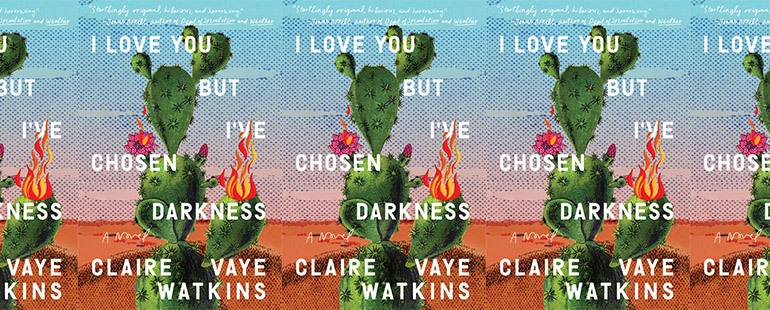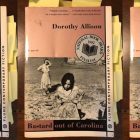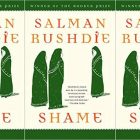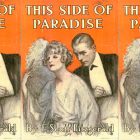The Social Constructs of Womanhood in I Love You but I’ve Chosen Darkness

There’s an intentional millennial-ness—or, more specifically, something particular to the Oregon Trail generation, a microgeneration of the millennials—to Claire Vaye Watkins’s new novel I Love You but I’ve Chosen Darkness, out today. The protagonist, Claire Vaye Watkins—the writer’s alter ego—introduces herself as one of “the house-proud resource-hoarding whites I must count myself among.” Claire is a wife, mother, and professor who gives up these pinnacles of well-adjusted adult life when she opts not to return from a two-day stint as a visiting writer in Reno, Nevada. She drinks and does a lot of drugs—usually weed but sometimes mushrooms; masturbates and has a lot of sex with multiple lovers that goes beyond the bounds of her open marriage; and forgets her breast pump when she follows a lover throughout the West, an act that is ultimately negligible since she goes months before choosing to be with her baby again.
Though Watkins doesn’t explore the binary of who most deserves happiness—mother or baby (or even the baby’s dad back home)—she does liberate her alter ego from the inherently limited social constructs of motherhood and womanhood. In doing so, Watkins asks readers to sit with discomfort until something gives. “I am a banshee, but cannot get comfortable with being one, am always swinging from bansheeism to playacting sweetness and back,” Claire says. “The truth is I cannot play nice and don’t want to, but want to want to, some days.” What do we do with a character who wants to want to play—but not actually be—nice? While she has the parts—baby, profession, marriage—Claire’s refusal to perform these elements of her life calls into question her very character, in others’ eyes and sometimes also her own. If Claire doesn’t fulfill these roles, then what is she? Unlike “motherhood” or “wifedom,” there is no ready category for Claire to exist in, a truth that ultimately poses an identity problem she reckons with throughout her journey away from her “homestead.”
Claire’s first stop along her modern Oregon Trail, from Ann Arbor to Reno, homestead to self-understanding, occurs when she reunites with some of her oldest friends and shares with them her lack of enthusiasm for married life and motherhood. Her friend Ty observes that she’s “turning out to be a dirtbag,” though another friend, Rust, remarks that she isn’t. “That’s the problem,” he says. “She’s not a dirtbag, but she wants to be.” Claire adds that she “want[s] to behave like a man, a slightly bad one.” In other words, to forsake her marriage and baby and career to the extent that she will, Claire must be a man, or at least act like one, but she can’t be a dirtbag and mother and wife, too, at least not according to existing tropes. When Claire is with her old friend Ivy in Reno, she notices that “She and I loved but no longer understood each other. Motherhood had wrenched us into separate spheres—she the attachment parent, me the detached mother.” Though motherhood should unite Claire with one of her oldest friends given cultural expectations, it does the opposite, which further indicates how far Claire is from being or even wanting to be what is expected of her. This disparity leaves her wondering if she is a dirtbag, since she can find no other model in between.
On her quest, Claire situates herself in a legacy of delinquency. She reflects on her childhood and her parents, each of whom failed their prescribed role in some way. Claire recalls watching footage of her father, Manson Family member Paul Watkins, on Larry King Live. “Here I am, my girls,” he says. “I want you to know how much I loved you. I want you to know who I was.” Watkins draws from her father’s memoir—Paul Watkins actually is the father of Watkins the writer—and Claire weaves Paul’s recollections into her own story. Her father died when she was six, “while [she] was doing somersaults in a busted hot tub and [her] sister was beside me counting.” So while her father’s no longer a part of the Family, his past is undeniably problematic; as her mother reminds her, Paul was “Charles Manson’s number one procurer of young girls.” Ultimately, through death, he abandons Claire and her sister, and Claire charts the ways in which his absence shaped her childhood. Claire’s mother, too, drops the ball on parental expectations, partly in ways Claire found delightful. She recalls her mother’s pastime of “viewing things at night,” a euphemism for stealing at night (usually plants and landscaping elements that she then installed in her own garden). Other favorite childhood memories originate from her mother’s casual breaking and entering of homes on the market, where she would take Claire and her sister to pretend to hold another life for a little while. Later, though, her mother slipped into more troubling behavior, including opioid addiction and fatal overdose. Claire probes her parents and their absence again and again during her journey. She even tells her story in part through letters her mother wrote to her cousin when the girls were in middle and high school (here Watkins draws on actual letters her mother wrote her cousin). These letters and her father’s memoir become a map for Claire’s journey away from the country of her marriage.
Although Claire describes the ways she has been abandoned by her parents, Claire’s (temporarily) abandoned infant daughter, Ruth, is almost entirely absent from the novel. But it’s Claire’s imagining of the way her infant daughter thinks of her that highlights Claire’s own feelings about herself as a mother. Watching Ivy’s mothering, Claire sees “the Madonna radiance rolling off her,” which “scare[s] the hell of [her].” Rather than “unschooling . . . free-range babies” like Ivy, Claire drops her kid off at daycare 40 hours a week, and imagines Ruth thinking:
my bitch mama does selfish things like take a shower and try to finish a meal in peace. My bitch mama says she had a life before me and with my hands I say, all done . . . My bitch mama signed the barefoot waiver. My bitch mama put me in tumbling class. My bitch mama wants me bilingual . . . I want all the milk you can make and more . . . I want to rip your earrings out and your nose ring too, so that there is nothing shining in my way, nothing glinting between your eyes and mine mine mine.
Claire expresses here many of the ways she does not measure up to a mother like Ivy, but also many of the ways in which she simply wants to be a human but, due to her need to uphold the social conventions of motherhood, cannot. Ivy does not seem to feel the same fissure in her self that Claire does; Claire notes that Ivy has won at being a mother.
“On the first day of fall a woman woke up another woman,” she says. The woman is Claire, waking up from her c-section. “Outside, it was raining biblically. Cars floated down the hill. Certain wings of the hospital became barges, bobbing in the sea.” The baby is pricked and prodded, and “[t]hrough all this [Claire] mistakenly believed she was still herself. Then she took the baby home.” While some women’s birth stories—probably women like Ivy—are rife with wondrous descriptions of immediate bonding that eclipses the pain of childbirth, and some are chock full of physical trauma, Claire’s is dominated by the trauma of her one self being consumed by another. Even in the telling, her self divides, and she splits first person from third. Her story is less about the birth of her baby and more about the death of her former self—and the jarring birth of another. She feels sucked dry by the baby, literally. “Motherhood had cracked me in half,” she thinks. “My self as a mother and my self as not were two different people, distinct.” Shortly after labor, Claire is diagnosed with post-partum depression and wonders when the diagnosis will shift to “regular depression.” Her unhappiness runs deep as she stares into the abyss that cleaves her self.
Rather than return home from her journey to Reno, Claire wanders the west, ultimately landing in the desert—first in the town she vowed she’d never return to, her mother’s town, Las Vegas, and then in Tecopa, the Death Valley town she where she lived when her father was still alive and her mother wasn’t high on opioids all the time. In the land of her childhood, she is baptized in the hot springs she once visited with her mother, made new by the mud her father once coated his body with in an attempt to cure his cancer. Now, these waters not only return her to herself, but also to her body. “For most of my life it seemed my body had been molded by various structures—tight waistbands, bras, foot-binding high heels. How often had I invited—paid for—some wire to dig into me, and for what?” she asks. “If it was buoyancy I was after, all I had to do was come to the hot springs and float free, for once, and do it daily. I let myself be held by the fossil water.” The life she had wasn’t working, bound as she was by constricting structures. She understands that she must return at some point to some semblance of the life she once had—or else abandon her baby altogether. But to return, she must find a new way to live, a way that honors her self first and foremost.
Before Claire reunites with her husband, Theo, and baby, she walks the desert canyons and reckons with her relationship to them. “I apologized to [Theo] and to Ruth for the ways I had ‘prepared’ for her, that is, by buying shit,” she says. “I apologized for the care and grief and attention I poured into various pieces of plastic, the deliberation I had taken in their purchase, the grotesquery of this agreed-upon ritual, what a doofus I’d been for doing that as a way of getting ready to receive her.” Just as she has come to recognize the ways in which she has artificially and unhealthily confined herself physically and mentally, she now sees the frivolity of preparing for a baby not spiritually but with stuff. She lets die the mother she thought she was supposed to be, and when Theo and Ruth join her in the desert, Claire shares with them her earliest history, what she’s culled from it, and the way she’s been made new. Even though she is a woman, she has done what her father once did: drinking and smoking and sleeping around in the desert. She has also lived out fraught flirtations that mirror those in her mother’s girlhood letters. “‘Look that moon,’” her baby says to her when they are together in the desert. “She said every time she saw the moon, and every time I looked.”
This piece was originally published on October 5, 2021.



